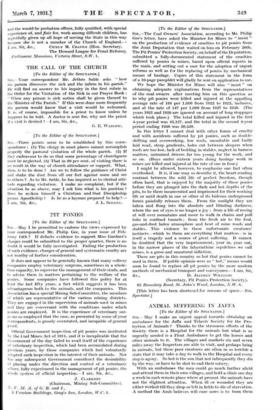[To the Editor of the SPECTATOR.]
Sra,—The Coal Owners' Association, according to Mr. Philip Gee's letter, have asked the Minister for Mines to "• insist " on the production of evidence of cruelties to pit ponies from the Joint Deputation that waited on him on February 26th. The Pit Ponies' Protection Society, on behalf of the Deputation, submitted a fully-documented statement of the cruelties suffered by ponies in mines, based upon official reports in the main, and setting out a case for the- adoption of urgent reforms as well as for the replacing of ponies by mechanical means of haulage. Copies of this statement in the form of a 16-page pamphlet will gladly be sent on application to me.
We hope the Minister for Mines will also " insist " on obtaining adequate explanations from the representatives of the coal owners after meeting him on this question as to why pit ponies were killed and injured at the, appalling average rate of 168 per 1,000 from 1922 to 1925, inclusive, and at the rate of 147 per 1,000 from 1927 to 1930. (The years 1921 and 1926 are ignored on account of long stoppages which took place.) The total killed and injured in the first 4-year period was 43,127, and the total in the second 4-year. period ending 1930 was 30,429.
In this letter I cannot deal with other forms of cruelty and with accidents suffered by pit ponies, such as double- shifting and overworking, low roofs, unsuitable and badly laid road, steep gradients, holes cut between sleepers when roofs are too low, lack of bedding in stables, neglect in harness matters, untrained drivers far too young for the work, and so on. (Boys under sixteen years doing haulage work in mines are killed and injured at the rate of one in four.) I might be allowed, however, to emphasize one fact often overlooked. It is, if one may so describe it, the heart-rending contrast between the wild life of perfect freedom, though often hard, that is enjoyed by the majority of these ponies before they arc plunged into the dark and hot depths of the pits, to be there incarcerated and imprisoned for their working life or until death in one or other of its hideous underground forms painfully releases them. From the sunlight they are taken and flung into the absolute and blinding darkness, where the use of eyes is no longer a joy ; from a life of roving at will over mountains and moor to walk in chains and pull tubs in confined tunnels ; from the fresh air to the foul, gas-and-dust laden atmosphere and heat of mine roads and stables. This violence to these unfortunate creatures' instincts—which to them are everything that matters—is in itself a tragedy and a source of great suffering. It cannot be doubted that the very imprisonment, year in, year out, in the narrow places of the labyrinthine sepulchres we call mines, is a gross and unnatural infliction.
There are pits in this country so hot that ponies cannot be used in them. If public opinion were as hot," means would soon be found to replace all pit ponies by the more modern methods of mechanical transport and conveyance.—I am, Sir,
&c., D. JEFFREY WILLIAMS (Secretary, Pit Ponies Protection Society). 82 Boundary Road, St. John's Wood, London, N.W. 8.
[This letter has been shortened for reasons of space.—En. Spectator.]


























































 Previous page
Previous page